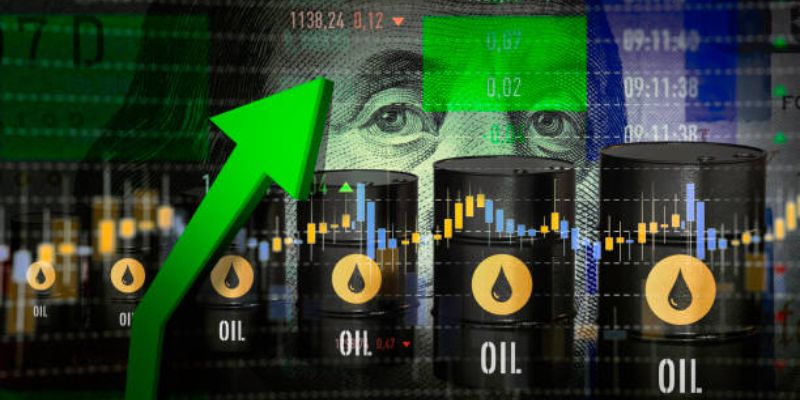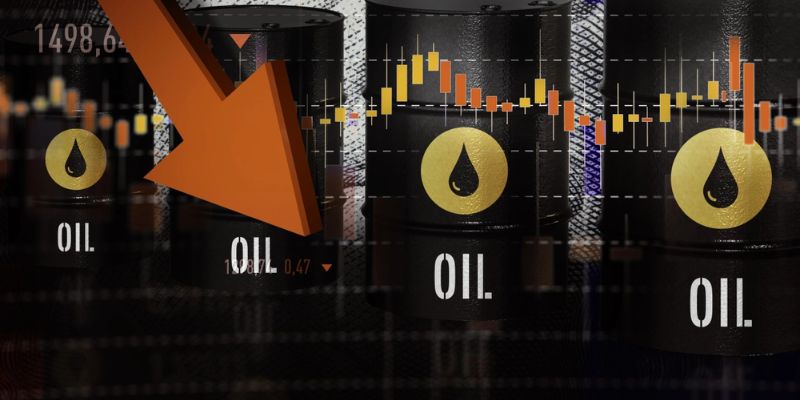Windfall Tax Effect on Crude Oil Prices
Triston Martin
Oct 19, 2023
Crude oil is an essential commodity and a major energy source in our day-to-day lives. As its price fluctuates due to various factors, it has wide-reaching economic implications that can affect economies worldwide.
One such factor driving up crude oil prices is the windfall tax imposed by some governments; these taxes aim to capture excess profits from rising oil prices and share them among producers and citizens alike. We'll be discussing the effect of windfall taxes on crude oil prices, exploring how they work, and their implications for producer nations and consumers further down the value chain.
Windfall Tax on Oil and Gas Production

A windfall tax on oil and gas production is a government levy to capture excess profits from rising oil prices. It taxes producers of crude oil, natural gas, coal, or other energy sources when their profits greatly exceed what they could expect in an average market cycle; typically, the commodity's price is significantly higher than its historic average.
These taxes aim to redistribute some revenue to citizens and public projects such as infrastructure development. Windfall taxes are often applied at a fixed rate depending on the particular commodity and may also apply different rates for different types of producers.
How Does Windfall Tax Work

Windfall taxes may be applied differently, depending on the country and situation. In general, however, these taxes are triggered when the price of a commodity in question rises above a certain point.
Once this threshold is reached, producers must pay a tax rate typically higher than normal if the market functions within its normative range. This extra tax revenue goes to the government to fund public projects or is shared among citizens as rebates or other incentives.
Some governments also use windfall taxes to create additional funds for special projects such as renewable energy research and development or green initiatives.
These funds can help finance infrastructure improvements, support local businesses with grants and tax breaks, and provide relief during economic downturns, among other uses.
Effect of Windfall Tax on Crude Oil Prices
- Windfall taxes can cause oil prices to rise, as producers will need to pass on the costs of the tax to consumers. The effect of a windfall tax on crude oil prices could significantly burden nations or industries heavily reliant on oil and gas production.
- At the same time, windfall taxes also incentivize producers to increase efficiency and invest in renewable energy sources, helping reduce their dependence on petroleum products.
- Windfall taxes help ensure that citizens benefit from rising commodity prices by providing rebates or other financial assistance; this can lead to greater economic stability and faster GDP growth over time.
- An increase in crude oil prices due to windfall taxes may also have a ripple effect in other sectors of an economy; businesses may raise their prices to cover their costs, leading to inflation.
- Windfall taxes may reduce investment in oil and gas exploration or development projects; producers may become reluctant to invest if they know the government will tax any excess profits.
- Governments can use the large amounts of revenue generated from windfall taxes for public projects such as infrastructure development, renewable energy research, or green initiatives; this can benefit both citizens and producers by creating new jobs and stimulating economic growth.
- Windfall taxes on crude oil production can hurt producer countries' economies; increases in taxation could cause these countries to miss out on potential investments which would otherwise benefit them financially.
- Finally, windfall taxes can make it more difficult for producers to adjust their pricing strategies, leading to a lack of flexibility and potential losses in profits. This could reduce competition within the industry and lead to higher prices for consumers.
Examining OPEC’s Response to Windfall Tax
The Organization of Petroleum Exporting Countries (OPEC) is an intergovernmental organization of oil and gas-producing nations that works to regulate the supply and price of crude oil.
In response to windfall taxes imposed by some countries, OPEC has adopted a position that such taxes should be based on “world market prices” instead of those in individual countries.
This means that producers subject to windfall taxes may receive the same level of compensation for their production regardless of where they are located. OPEC also opposes any form of taxation which it believes would lead to significant reductions in investment or incentives for efficient production.
Some governments have protested this position, arguing that OPEC should have no say in how their countries tax domestic production. Others argue that windfall taxes can help ensure citizens benefit from rising commodity prices and that oil profits can be redistributed among producers and consumers.
Windfall taxes are an effective tool for governments to capture excess profits from rising oil prices and redistribute them among producers and citizens.
However, it is important to weigh the potential effects of such taxes on crude oil prices before implementing them; they may lead to increased consumer costs or reductions in investment and incentives for efficient production.
Alternatives to Windfall Tax On Crude Oil Prices
Some governments have implemented carbon taxes or cap-and-trade systems as an alternative to windfall taxes. These strategies are based on the idea that producers should pay for their externalities, in this case, carbon emissions, instead of citizens and taxpayers.
In addition, some countries have adopted progressive taxation systems, which increase the rate of taxation when oil prices rise above a certain point. This structure helps ensure that excess profits are not completely removed from the market but redistributed among citizens and public projects.
Governments can also use subsidies and incentives to encourage producers to invest more in renewable energy sources or other projects that benefit society.
FAQS
How did reduced taxes help fuel economic growth?
Tax reductions can help fuel economic growth in several ways. Lower taxes may encourage businesses to invest more in their operations, hire more employees, and expand production. This increased investment and spending leads to greater economic output, creating jobs and boosting GDP. Tax cuts can also put more money into consumers' pockets, which they can then spend on goods and services, further stimulating the economy.
What happens to the economy when taxes decrease?
When taxes decrease, the government collects less revenue. This can lead to budget deficits or reduced spending on public services such as education and healthcare. Lower taxes can also increase economic inequality by reducing the tax burden of wealthy individuals and corporations while increasing the burden for those with lower incomes. Decreased taxes may incentivize businesses to shift profits overseas or invest more in low-tax jurisdictions, which could reduce economic activity in the country that initially reduced taxes.
What happens to the economy if the government increases taxes?
When the government increases taxes, it collects more revenue. This can help to reduce budget deficits or fund public services such as education and healthcare. Higher taxes may also reduce economic inequality by increasing the tax burden of wealthy individuals and corporations while decreasing the burden on those with lower incomes.
Conclusion
In conclusion, the Windfall Tax has significantly affected crude oil prices since its introduction in 1980. This tax is an overall cost to consumers because it is applied to natural resources like crude oil. Windfall taxes may decrease production and the producers' return on investment, as companies must factor in the costs of these taxes when creating their pricing models. However, understanding the history and purpose of windfall taxes can help us better understand how they impact crude oil prices.







